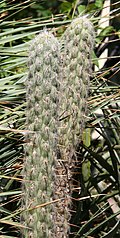Oreocereus
| Oreocereus | |
|---|---|

| |
| Oreocereus celsianus | |
| Scientific classification | |
| Kingdom: | Plantae |
| Clade: | Tracheophytes |
| Clade: | Angiosperms |
| Clade: | Eudicots |
| Order: | Caryophyllales |
| Family: | Cactaceae |
| Subfamily: | Cactoideae |
| Tribe: | Cereeae |
| Subtribe: | Trichocereinae |
| Genus: | Oreocereus (A.Berger) Riccob. |
| Type species | |
| Oreocereus celsianus | |
| Species | |
| Synonyms[1] | |
| |
Oreocereus is a genus of cacti (family Cactaceae), known only from high altitudes of the Andes. Its name means "mountain cereus", formed from the Greek prefix oreo- (ὀρεο-, mountain)[2] and the Neo-Latin cereus, meaning wax or torch.
Description
The species of the genus Oreocereus grow shrubby, branching only sparsely from the base and reach heights of growth of 2 to 3 meters. Trunks are rarely formed. The erect, pendulous or rarely extended cylindrical shoots are notched or warty between the ribs. The areoles often have long white hairs and dense spines. As they are covered with woolly white fuzz (modified spines), a few species in this genus are sometimes known as the old-man cactus,[3][4] a generic name that also refers to Cephalocereus senilis or Espostoa lanata. More rarely, the old man of the mountain is also used for some species.[nb 1]
The tubular to funnel-shaped, more or less radially symmetrical, orange to red to violet flowers arise near the shoot tip, or sometimes from the terminal cephalium, and open during the day. The flower-tube is straight to slightly curved and sometimes laterally compressed. The numerous areoles on the pericarpel and the flower tube are hairy. The spherical to oblong fruits contain broadly oval, dull or shiny black seeds.[7][8]
Species
As of September 2023, Plants of the World Online accepts the following species:[1]
| Image | Scientific name | Distribution |
|---|---|---|
 |
Oreocereus celsianus (Lem. ex Salm-Dyck) A.Berger ex Riccob. | Peru, Bolivia, Argentina (Jujuy) |
 |
Oreocereus doelzianus (Backeb.) Borg | Peru. |
 |
Oreocereus hempelianus (Gürke) D.R.Hunt | Peru to Chile (Tarapacá) |
 |
Oreocereus leucotrichus (Phil.) Wagenkn. | Chile, Peru |
 |
Oreocereus pseudofossulatus D.R.Hunt | Bolivia. |
 |
Oreocereus ritteri Cullmann | Peru |
| Oreocereus tacnaensis F.Ritter | Peru | |
 |
Oreocereus trollii (Kupper) Backeb. | Argentina, Bolivia |
References
- ^ “[...] hairy cacti in cultivation include: golden old man (C. chrysacanthus), old woman (Mammillaria hahniana), Chilean old lady (Neoporteria senilis), and old man of the mountain (Borzicactus trollii).”[5] [emphasis added, B. trollii being an old name for O. trollii].[6]
- ^ a b "Oreocereus Riccob. — Plants of the World Online". Plants of the World Online. 2020-02-03. Retrieved 2023-09-29.
- ^ "oreography". Oxford English Dictionary (Online ed.). Oxford University Press. (Subscription or participating institution membership required.)
- ^ University of Vermont, Indoor Plants
- ^ Barry Walker; Huw Lloyd (2007). Peruvian Wildlife: A Visitor's Guide to the Central Andes. Bradt Travel Guides. p. 23. ISBN 978-1-84162-167-8.
- ^ Encyclopædia Britannica (1991), entry ‘old-man cactus’.
- ^ D. J. Mabberley (2008-05-01). Mabberley's Plant-book: A Portable Dictionary of Plants, Their Classifications, and Uses. Cambridge University Press. p. 608. ISBN 978-0-521-82071-4.
- ^ Backeberg, Curt (January 1984). Die Cactaceae (in German). Fischer. pp. 2619–2629. ISBN 3-437-30383-X.
- ^ Anderson, Edward F.; Eggli, Urs (2005). Das grosse Kakteen-Lexikon (in German). Ulmer. p. 482. ISBN 3-8001-4573-1.
External links
 Media related to Oreocereus at Wikimedia Commons
Media related to Oreocereus at Wikimedia Commons Data related to Oreocereus at Wikispecies
Data related to Oreocereus at Wikispecies
